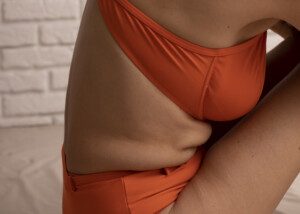My older sister told me, “You either gain weight or lose weight in college; you never stay the same.”
It had no effect on me. It had been a mere observation of hers – that’s how I had perceived it.
I was probably in ninth grade at the time, because that was when she had entered her first year of college.
Though my sister’s line never had a negative effect on me, it’s one of those statements that have been forever etched in my memory.
In fact, a TON of statements from various family members on all topics are permanently etched in my memory.
My memory banks are loaded with so many details that none of my five siblings remember.
But the reason I’m writing this article about that particular line is because, in this day and age, it would be regarded by many mental health counselors and body image influencers as a dangerous remark to make to a young teen girl.
In ninth grade, I was 13 and 14. So this was the age I had heard the remark, and at the time, I kind of thought it was a clever way of summarizing the phenomenon that, indeed, so many young women gain weight in college. And some trim down.
“You either gain weight or lose it; you never stay the same.”
This line, in NO way, put any fear inside my young teen head.
Again, it had been a mere statement by an older sister whom I had never gotten along with anyways.
I had never given her comment much thought, not beyond what I knew when she made the comment:
She was basically talking about herself but also referring to women college students in general – perhaps a pre-emptive justification should she come home spring break looking a little heavier.
There had always been teasing here and there among myself and my two older sisters about each other’s weight or potential weight.
None of us developed mental health issues due to that.
None of us had weight problems, either, but there were fluctuations such that at times, my two sisters looked a little solid, and as for myself, I was “athletic looking” in my last two years of high school – and I had always had a big appetite which would get my oldest sister’s attention.
“You’re gonna get SO FAT if you keep eating that way!” she’d announce.
Heck, didn’t bother me one iota. I kept chowing down two Big Macs at once or digging into the bread and soda.
With that all said, I also want to point out that the generation of girls I grew up with were a lot tougher than the young generation of today – for which my sister’s innocent and candid remark could be perceived as having the jolt of an axe attack on an adolescent or teen girl’s mind.
What happened to resilience or even just basic hardiness?

Why are what were innocent but truthful comments of a few generations ago now regarded as drivers of severe eating disorders, massive body image insecurities and body dysmorphia?
There’s clearly a much higher percentage of these issues among women than ever before; it doesn’t seem to be an illusion created by the high visibility of it on social media.
Certainly, if a woman keeps harassing her overweight daughter about her plump size, and making comments such as, “You’ll never get married with the way you keep getting fatter,” then this can have a profound and long-term effect on that girl’s sense of self, sense of worth, and lead to serious eating disorders.
But it’s gotten to a point where the young women of today get “triggered” by hearing innocuous comments – that aren’t even directed at them personally.
For example, I can only imagine the brimming number of young adult influencers on Instagram and TikTok who shudder, cringe and get rattled for an entire day upon coming across the following words in print: The Freshman 15.
There’s a gigantic difference between hearing one’s mother lob one insult after another about your body, right to your face – and that of overhearing a stranger at the airport jokingly tell her older brother who has come to pick her up from college, “Look at me, Freshman 15!”
Yes, if some of these fragile influencers overheard this, it would trigger them – some even enough to actually go over to that college student and tell her something like, “You really shouldn’t say that; you’re perfect just the way you are!”
I can easily see that college student perceiving the advice as condescending, patronizing and an underestimation of her self-confidence.
- Telling a girl she’s “beautiful just the way she is” has a condescending component that may make her feel more inept, more incapable if she’s already lacking self-value.
- She may take it as a desperate attempt of the commenter to instill her with self-esteem, when in fact, it’s so overly broad that it suggests that the commenter pities the girl and views her as somehow inadequate – or pitiful. Nobody wants to be thought of in this fashion!
Today’s generation of young women are pulling a Charmin: They are ultra-soft.
And Here Is the Irony
This generation, more than any other, has been exposed to an inundation of body positivity “messages.” It’s just everywhere.
- Increased representation of plus-size women in TV commercials, ads (e.g., Dove) not related to weight loss or plus clothing, and characters in TV shows for which weight is not part of the storyline.
- A bombardment of graphics on Instagram relating to “All bodies are good bodies,” etc.
- And much more
Yet this generation is the most effed-up when it comes to body image.
This includes among women whose body has always fit the so-called beauty standard.
I grew up during an era where the term “body positivity” hadn’t yet been coined.
None of that stuff existed in any shape, way or form.
If any of my female classmates had the extensive body image insecurities or dysmorphia that today’s teens and adolescents have, then they had done a stellar job of hiding it.
Even my many fat classmates had no qualms about their size. Hmmm… we didn’t have TikTok and Instagram back then, either. Coincidence?
It’s tempting to blame today’s dramatic increase in body image problems on digital filters, Photoshop and clever posing by “beautiful” influencers.
However, the volume of body positivity accounts is staggering, seemingly exceeding that of influencers with “perfect” bodies who filter their waistline to be smaller and smooth out the cellulite.
Nowadays, with all these young influencers – many from privileged backgrounds – continuously posting messages relating to women’s bodies, why is it that the last 20 years have seen the most prevalence of body image disorders and the like?
• Is it because of weight loss ads? No. Those had been on TV left and right by the time I entered college.
I even recall the Ayds Reducing Plan Candy commercials. “Ayds satisfies your need to taste, chew and swallow,” was the ads’ tag line.
My other older sister once bought a box (we were like 12 and 15) and we tried them, thinking they’d curb our appetites.
I vividly recall being in her room when we tried them. They tasted awful.
She stood on the roomy ledge outside her second-story window and tossed the box’s contents into the air, scattering all the little candies.
Another etched memory, but to this day, I think it’s kind of humorous, the way we reacted to the taste, and the sight of all those candies flying in the air.
Weirdly, there are many influencers who’d want to sternly lecture me for thinking any of this was amusing.
• Is it becaues of GLP-1 ads? No; GLP’s as weight loss aids didn’t start slamming the market till about 2021.
• How about the abundant saturation of body image platforms on Instagram and TikTok? BINGO.
The excessive saturation has had the opposite effect, making girls, teens and young women think more than ever about their bodies. It has backfired.
One of the summed messages can be: “You TOO can be a sex object!”
These influencers regularly post image after image after image of themselves with barely any clothes on, often in lewd or seductive poses — yet strongly broadcasting the message that women aren’t “more than their bodies.” Does this make even a microgram of sense?
Many post video after video of themselves prancing around nearly naked, tugging at their belly rolls, shaking their big tummy close to the camera – I mean, come ON, if this doesn’t spread the message that women ARE ornaments and are indeed nothing more than bodies, then what does?
Their message is loud and clear: “The most important thing about a female is how her body looks.”
And these influencers, many with admitted mental health issues, just keep pounding out this message with no let-up.
No wonder today’s generation of females is the most mixed-up ever when it comes to self-worth, self-confidence and body image.
- Stop posting about your body insecurities.
- Don’t post that for many years you refused to wear a sleeveless top and now you finally have the body confidence to do so, but then there are a shit-ton of pictures of you going back many years wearing sleeveless tops.
- Stop posting those incredibly absurd “two second body transformations,” which are a mockery of actually overweight women who can’t make belly rolls disappear by simply adjusting their posture!
We live in a world in which a woman is considered a role model if she posts these ridiculous two second transformations and talks about how other influencers use filters and posing tricks to look “perfect.” (Um, women have been posing to look the most flattering since the invention of the camera in the 19th century.)
What happened to the idea that female role models were firefighters, scientists, surgeons, business owners, inventors, etc.?
![]()
Lorra Garrick is a former personal trainer certified by the American Council on Exercise. At Bally Total Fitness, where she was also a group fitness instructor, she trained clients of all ages and abilities for fat loss and maintaining it, muscle and strength building, fitness, and improved cardiovascular and overall health.
.










































